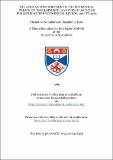The African contribution to the ecumenical debate on development : a survey of articles published in The Ecumenical Review, 1967 to 1985
Abstract
The social and economic conditions as well as political instability in the developing world and particularly Africa, is the concern of this thesis. The situations in the developing world seem ever to be worsening. Why? What are the causes? What has so far been done, is being done and can still be done to reverse these situations? These are indeed the sort of questions our discussion is revolving around. My approach to these problems of the developing nations and particularly the African countries, in this discussion is through: The Articles on Development, published in the Ecumenical Review from 1967 to 1985. My attention is particularly focussed on how the African authors see the problems of their continent, then how the non-African authors also see them. To discuss this effectively, I have in the first three chapters of this thesis, carefully summarized the most relevant articles on development within this period 1967 to 1985, and each with a comment. The importance of this summarization of the articles, is to acquaint us with the general views of the authors and the most important points of the discussion. Articles from 1967-1968 (first period), are in chapter one; 1969-1972 (second period), in chapter two and 1974-1985 (third period), in chapter three. In chapter four, is a comparative assessment of the contributions of the non-African authors which I have discussed in two parts. In Part I, I have argued that they are largely in agreement on the several major topics they raise with regard to the social and economic growth in Africa and their political stability, covered under: The Need for Structural Changes; Justice; Economic Liberation; Labour Intensive Industries; Self-Reliance; International Rationing of Basic Commodities; Participation; The Church's Role; and Development As God's Command. I have also in Part II, pointed out that: Overpopulation; Rural Labour Industrial Economy, with emphasis on agriculture, education and lack of capital are the dominant issues in the first period 1967-1968. In the second period 1969-1972, the discussion by the non-African authors moved rather towards the place and role of the church in development while in the third period 1974-1985, we see a remarkable advance in their discussion. Not only was the importance of modern science and technology for development brought to light, but development was given a new meaning. It was redefined to mean justice. In fact the whole issue took a new turn with greater emphasis on liberation, self-reliance and participation all of which were seen as only possible through the establishment of justice and without which development in reality is impossible. Chapter five is devoted to a comparative assessment of the African authors. This is in three parts. In each part, I have made comparisons between the authors on the major related issues, and taking note of any major advance in their contributions from period to period. Chapter six is therefore an evaluation of the African and non-African contributions to the Ecumenical Debate on Development 1967-1985, and I have argued that they are largely in agreement with regard to the causes of the underdevelopment of Africa and in most of their solutions to the problems. I have therefore concluded by pointing out that with few exceptions, most of the African authors were mainly translating a universal situation into specific African context. I also note the important factors which according to the African authors, have helped to cause underdevelopment in Africa and the remedies they suggest.
Type
Thesis, MPhil Master of Philosophy
Collections
Items in the St Andrews Research Repository are protected by copyright, with all rights reserved, unless otherwise indicated.

